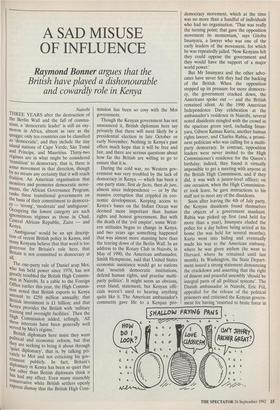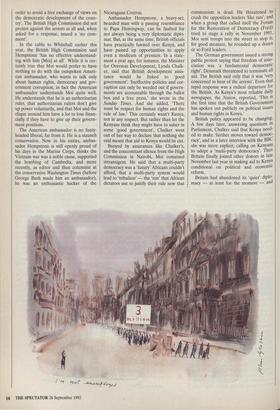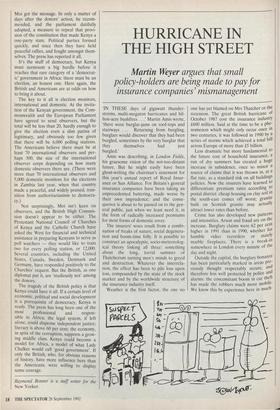A SAD MISUSE OF INFLUENCE
Raymond Bonner argues that the
British have played a dishonourable and cowardly role in Kenya
Nairobi THREE YEARS after the destruction of the Berlin Wall and the fall of commu- nism, a 'democratic leader' is still an oxy- moron in Africa, almost as rare as the quagga; only ten countries can be classified as 'democratic', and they include the tiny island nations of Cape Verde, Sao Tome and Principe, and Mauritius. Thirty-two regimes are in what might be considered transition' to democracy, that is, there is some movement in that direction, though by no means any certainty that it will reach fruition. An American organisation that monitors and promotes democratic move- ments, the African Governance Program, ranks these transitional governments on the basis of their commitment to democra- cy — 'strong', 'moderate' and 'ambiguous'. Occupying the lowest category are such ignominious regimes as those in Chad, Central African Republic, Zaire — and Kenya.
`Ambiguous' would be an apt descrip- tion of recent British policy in Kenya, and Many Kenyans believe that that word is too generous for Britain's role here, that Britain is not committed to democracy at all.
The one-party rule of Daniel arap Moi, Who has held power since 1978, has not greatly troubled the British High Commis- sion in Nairobi. In a cable to the Foreign Office earlier this year, the High Commis- sten noted that British exports to Kenya amount to £250 million annually; that British investment is £1 billion; and that Kenya provides the British with 'military training and oversight facilities'. Then the High Commission added, tellingly, 'All these interests have been generally well served by Moi's regime.' British diplomats here insist they want IX), laical and economic reform, but that they are seeking to bring it about through quiet diplomacy', that is, by talking pri- vately to Moi and not criticising his gov- ernment publicly. In fact, Britain's diplomacy in Kenya has been so quiet that levy other than British diplomats think it has had any effect. Even many staunchly conservative white British settlers openly express dismay that the British High Corn- mission has been so cosy with the Moi government.
Though the Kenyan government has not announced it, British diplomats here say privately that there will most likely be a presidential election in late October or early November. Nothing in Kenya's past offers much hope that it will be free and fair, and there are serious questions about how far the British are willing to go to ensure that it is.
During the cold war, no Western gov- ernment was very troubled by the lack of democracy in Kenya — which has been a one-party state, first de facto, then de jure, almost since independence — or by the massive corruption that crippled its eco- nomic development. Keeping access to Kenya's bases on the Indian Ocean was deemed more important than human rights and honest government. But with the death of the 'evil empire', some West- ern attitudes began to change in Kenya, and two years ago something happened that was almost more stunning here than the tearing down of the Berlin Wall. In an address to the Rotary Club in Nairobi, in May of 1990, the American ambassador, Smith Hempstone, said that United States economic assistance would go to nations that 'nourish democratic institutions, defend human rights, and practise multi- party politics'. It might seem an obvious, even bland, statement, but Kenyan offi- cials weren't used to hearing anything quite like it. The American ambassador's comments gave life to a Kenyan pro- democracy movement, which at the time was no more than a handful of individuals who had no organisation. 'That was really the turning point; that gave the opposition movement its momentum,' says Gitobu Imanyara, a lawyer who was one of the early leaders of the movement, for which he was repeatedly jailed. 'Now Kenyans felt they could oppose the government and they would have the support of a major world power.'
But Mr Imanyara and the other advo- cates have never felt they had the backing of the British. When the opposition stepped up its pressure for more democra- cy, the government cracked down, the Americans spoke out — and the British remained silent. At the 1990 American Independence Day celebration at the ambassador's residence in Nairobi, several noted dissidents mingled with the crowd in the spacious green yard, including Iman- yara, Gibson Kamau Kuria, another human rights lawyer, and Charles Rubia, a promi- nent politician who was calling for a multi- party democracy. In contrast, opposition leaders were never invited to the High Commissioner's residence for the Queen's birthday; indeed, they found it virtually impossible to get a meeting with anyone at the British High Commission, and if they did, it was with a junior-level officer; on one occasion, when the High Commission- er took leave, he gave instructions to his staff not to meet any of the dissidents.
Soon after leaving the 4th of July party, the Kenyan dissidents found themselves the objects of a government manhunt. Rubia was picked up first (and held for more than a year), Imanyara eluded the police for a day before being seized at his home (he was held for several months); Kuria went into hiding and eventually made his way to the American embassy, where he was given asylum (he went to Harvard, where he remained until last month). In Washington, the State Depart- ment issued a strong statement denouncing the crackdown and asserting that the right of dissent and peaceful assembly 'should be integral parts of all political systems'. The Danish ambassador in Nairobi, Eric Fiil, appealed for the release of the political prisoners and criticised the Kenyan govern- ment for having 'resorted to brute force in order to avoid a free exchange of views on the democratic development of the coun- try'. The British High Commission did not protest against the arrests at all and, when asked for a response, issued a 'no com- ment'.
In the cable to Whitehall earlier this year, the British High Commission said Hempstone 'has no effective understand- ing with him [Moi] at all'. While it is cer- tainly true that Moi would prefer to have nothing to do with the outspoken Ameri- can ambassador, who wants to talk only about human rights, democracy and gov- ernment corruption, in fact the American ambassador understands Moi quite well. He understands that he is an authoritarian ruler, that authoritarian rulers don't give up power voluntarily, and that Moi and the clique around him have a lot to lose finan- cially if they have to give up their govern- ment positions.
The American ambassador is no fuzzy- headed liberal, far from it. He is a staunch conservative. Now in his sixties, ambas- sador Hempstone is still openly proud of his days in the Marine Corps, thinks the Vietnam war was a noble cause, supported the bombing of Cambodia, and more recently, as editor and then columnist at the conservative Washington Times (before George Bush made him an ambassador), he was an enthusiastic backer of the
Nicaraguan Contras.
Ambassador Hempstone, a heavy-set, bearded man with a passing resemblance to Papa Hemingway, can be faulted for not always being a very diplomatic diplo- mat. But, at the same time, British officials have practically fawned over Kenya, and have passed up opportunities to apply even a modicum of pressure. In a state- ment a year ago, for instance, the Minister for Overseas Development, Lynda Chalk- er, said that British development assis- tance would be linked to 'good government'. 'Ineffective policies and cor- ruption can only be weeded out if govern- ments are accountable through the ballot box and a free press,' she wrote in the Sunday Times. And she added, 'There must be respect for human rights and the rule of law.' This certainly wasn't Kenya, not in any respect. But rather than let the Kenyans think they might have to usher in some 'good government', Chalker went out of her way to declare that nothing she said meant that aid to Kenya would be cut.
Buoyed by assurances like Chalker's, and the concomitant silence from the High Commission in Nairobi, Moi remained intransigent. He said that a multi-party democracy was a 'luxury' Africans couldn't afford, that a multi-party system would lead to 'tribalism' — the 'ism' that African dictators use to justify their rule now that communism is dead. He threatened to crush the opposition leaders 'like rats', and when a group that called itself the Forum for the Restoration of Democracy (Ford) tried to stage a rally in November 1991, Moi sent troops into the street to stop it; for good measure, he rounded up a dozen or so Ford leaders.
The German government issued a strong public protest saying that freedom of asso- ciation was 'a fundamental democratic right'. Denmark threatened to terminate all aid. The British said only that it was 'very concerned to hear of the arrests'. Even that tepid response was a radical departure for the British. As Kenya's most reliable daily newspaper, the Nation, reported, 'This is the first time that the British Government has spoken out publicly on political issues and human rights in Kenya.'
British policy appeared to be changing. A few days later, answering questions in Parliament, Chalker said that Kenya need- ed to make 'further moves toward democ- racy', and in a later interview with the BBC she was more explicit, calling on Kenyans to adopt a 'multi-party democracy'. Then Britain finally joined other donors in late November last year in making aid to Kenya conditional on political and economic reform.
Britain had abandoned its 'quiet' diplo- macy — at least for the moment — and
Moi got the message. In only a matter of days after the donors' action, he recom- mended, and the parliament dutifully adopted, a measure to repeal that provi- sion of the constitution that made Kenya a one-party state. Political parties formed quickly, and since then they have held peaceful rallies, and fought amongst them- selves. The press has reported it all.
It's the stuff of democracy, but Kenya must surmount a big hurdle before it reaches that rare category of a 'democrat- ic' government in Africa: there must be an election, an honest one. Here again, the British and Americans are at odds on how to bring it about.
The key to it all is election monitors, international and domestic. At the invita- tion of the Kenyan government, the Com- monwealth and the European Parliament have agreed to send observers, but the total will be less than 20, hardly enough to give the election even a slim patina of legitimacy, and obviously too few given that there will be 6,000 polling stations. The Americans believe there must be at least 70 international observers and per- haps 300, the size of the international observer corps depending on how many domestic observers there are. (There were more than 70 international observers and 5,000 domestic monitors for the elections in Zambia last year, when that country made a peaceful, and widely praised, tran- sition from authoritarianism to democra- cy )
Not surprisingly, Moi isn't keen on observers, and the British High Commis- sion doesn't appear to be either. The Protestant National Council of Churches of Kenya and the Catholic Church have asked the West for financial and technical assistance in preparing Kenyans to serve as poll watchers — they would like to train two for every polling station, or 12,000. Several countries, including the United States, Canada, Sweden, Denmark and Germany, have responded positively to the Churches' request. But the British, as one diplomat put it, are 'studiously not' among the donors.
The tragedy of the British policy is that Kenya could have it all. If a certain level of economic, political and social development is a prerequisite of democracy, Kenya is ready. The press has long been one of the
most professional and respon- sible in Africa; the legal system, if left alone, could dispense independent justice; literacy is above 60 per cent; the economy, in spite of the corruption, supports a grow- ing middle class. Kenya could become a model for Africa, a model of what Lady Chalker would call 'good government'. If only the British, who, for obvious reasons of history, have more influence here than the Americans, were willing to display some courage.
Raymond Bonner is a staff writer for the New Yorker.




































































 Previous page
Previous page